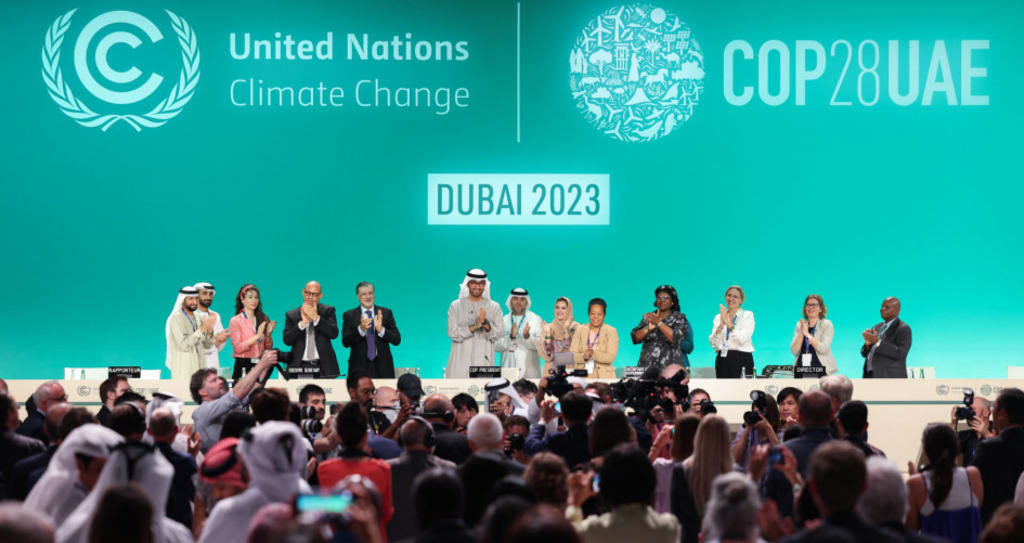COP 28 RESULTS: ACCOMPLISHMENTS, FAILURES AND CONTROVERSIES
COP 28 was a UN conference on climate change that wrapped up this week. Find out why many observers believe the results don’t go far enough and that the parties’ commitments are too vague to seriously address the climate crisis.

A couple of weeks ago, I posted some thoughts on the 28th Conference of the Parties on to the UN Framework Convention on Climate Change (COP 28). It’s the annual conference to review progress and plan next steps on the climate crisis.
The conference hadn’t started when I shared those thoughts on what to expect. I expressed a common concern that these conferences of the parties often end up being “all talk and no action.”
The COP28 gathering of 85,000 people in Dubai is over now, so I can talk about some results. There were accomplishments, failures and controversies, and I’ll address the main ones in this post.
AGREEMENT TO “TRANSITION AWAY FROM FOSSIL FUELS”
Let’s start with what the parties achieved. Probably the most noteworthy result was that the 197 countries taking part reached a unanimous consensus in their agreement, called the “global stocktake,” to “transition away from fossil fuels.”
Some readers may be surprised that this was something new for an annual gathering on climate change. It’s sad but true, that the parties have never committed to moving away from fossil fuels in any of the previous 27 conferences of the parties.
So I guess we can consider that progress. We’ve known that burning fossil fuels causes rising temperatures since 1896, so I suppose we should be pleased to see our governments catching up with the science.
HOSTED BY DUBAI, A WEALTHY OIL PRODUCER
Arriving at that consensus was a bigger victory that it might seem, because Dubai is in the United Arab Emirates (UAE). The oil and gas industry has made the UAE one of the world’s wealthiest nations.
At least 2,500 fossil fuel lobbyists had flocked to the COP 28 Green Zone to try to prevent the new consensus, but in the end the parties agreed. Negotiating the wording proved to be so difficult that the parties had to pull several all-nighters and extend the conference deadline.
The final text calls for, “Transitioning away from fossil fuels in energy systems, in a just, orderly and equitable manner, accelerating action in this critical decade, so as to achieve net zero by 2050 in keeping with the science.”
“THIS OUTCOME IS THE BEGINNING OF THE END”
The UN’s climate change executive secretary, Simon Stiell, hailed the wording saying, “While we didn’t turn the page on the fossil fuel era in Dubai, this outcome is the beginning of the end.” The agreement calls also calls for stronger measures to keep the the rise in global temperatures below 1.5˚C.
Another COP 28 achievement was kickstarting the long-promised loss and damage fund that the World Bank will manage. The developed countries who are most responsible for the climate crisis pledged of $700 USD to the fund.
This is good news for developing countries, who’ve been calling for this kind of financial support for over a decade. Even so, as the Guardian points out, this represents just 0.2% of the economic losses and ecological damage global warming is inflicting on the less affluent countries in the Global South.
ADDITIONAL FUNDING FOR GREEN CLIMATE FUND
The Green Climate Fund was another financial accomplishment. Six countries pledged additional funding, raising the total pledges to $12.8 billion USD.
Once again, these pledges fall far short of the trillions of dollars humanity will need in the long run to help developing countries transition to green energy. The parties recognized this, urging reforms to the multilateral financial architecture and new funding sources.
Observers say the COP 28 agreement doesn’t go far enough, and that it’s also too vague. In particular, the wording “transition away from fossil fuels” is watered down from the expected “phase out” or “phase down” language.
DEVELOPING COUNTRIES WANTED MORE DEFINITE FINANCIAL SUPPORT
Many developing countries were looking for much more definite language about financial support for the green energy transition. Although the text calls for making the transition in “a just, orderly and equitable manner,” that’s a loophole you could through which wealthy oil-producing countries could drive a diesel locomotive.
Secretary Stiell noted in his comments that, “Now all governments and businesses need to turn these pledges into real-economy outcomes, without delay.” We’ve heard comments like this from UN officials after every COP meeting, mainly with disappointing results.
Regardless of the practical results, the annual COP meetings do serve a purpose. They’re part of the new story humanity needs about the natural world and humanity’s place within it.
AND ANOTHER THING…
The majority of those 85,000 people who gathered in Dubai for COP 28 were part of a growing global movement to fight the climate crisis. Secretary Stiell acknowledged that.
He concluded his remarks saying, “My final message is to ordinary people everywhere raising their voices for change. Every one of you is making a real difference.
“In the crucial coming years your voices and determination will be more important than ever. I urge you never to relent. We are still in this race. We will be with you every single step of the way.”
We always have more to learn if we dare to know.
LEARN MORE:
COP 28 Agreement Signals “Beginning of the End” of the Fossil Fuel Era
Outcome of the first global stocktake
COP 28: Frustration, Scepticism, Faint Trace of Hope
About the Creator
David Morton Rintoul
I'm a freelance writer and commercial blogger, offering stories for those who find meaning in stories about our Universe, Nature and Humanity. We always have more to learn if we Dare to Know.






Comments
There are no comments for this story
Be the first to respond and start the conversation.